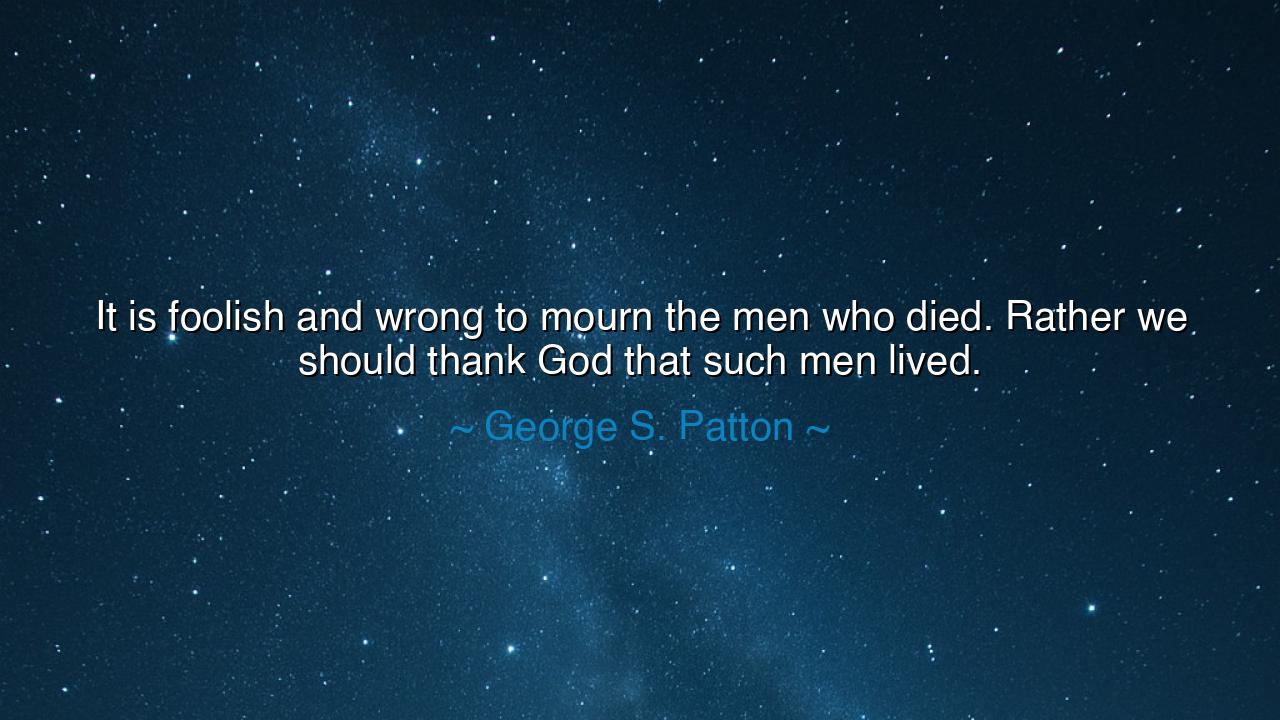
It is foolish and wrong to mourn the men who died. Rather we
It is foolish and wrong to mourn the men who died. Rather we should thank God that such men lived.






“It is foolish and wrong to mourn the men who died. Rather we should thank God that such men lived.” — thus thundered General George S. Patton, a soldier of iron and spirit, whose words, like the man himself, burned with courage and conviction. In this declaration lies not a dismissal of sorrow, but a call to reverence through gratitude. It is a warrior’s hymn, spoken in the voice of one who understood the sacred price of freedom and the eternal duty of the living to honor the fallen not with tears alone, but with purpose. In this sentence, Patton transforms mourning into thanksgiving, and loss into legacy.
To understand the heart of this quote, we must return to its origin — a speech delivered in the aftermath of World War II, when the world lay bruised yet victorious, its soil soaked with the blood of heroes. Patton, the great general of the American Third Army, had seen death close enough to feel its breath. He had watched young men fall in battle — sons, brothers, friends — and had seen the grief that followed them home. Yet he also knew that to dwell only on death was to diminish the greatness of their sacrifice. These men did not die to be mourned in endless sorrow; they lived to fight, to defend, to preserve a world worth living in. Thus Patton, standing before his soldiers and countrymen, urged the living to lift their eyes — to thank God that such men lived, that such courage had walked the earth.
In the spirit of the ancients, this idea resounds like the voice of a Stoic sage or a Spartan leader. The warriors of old believed that to die for one’s people was not tragedy but triumph. The soldier who fell in battle did not fade into oblivion; he entered the eternal fellowship of honor. Patton’s words echo this timeless creed — that heroism transcends death. To mourn excessively is to see only the loss, but to give thanks is to see the light that these men brought into the world. Their lives, however brief, burned with purpose, and it is that flame, not the ashes, that deserves remembrance.
Consider the story of Audie Murphy, one of the most decorated American soldiers of World War II. Barely twenty years old, small in stature but vast in heart, he stood alone atop a burning tank, holding off hundreds of enemy soldiers with nothing but a machine gun and unyielding will. He survived that battle, but many like him did not. To mourn them is natural; to be paralyzed by that mourning is not. For Murphy and his fallen brothers lived not as victims, but as victors. Their courage secured peace for millions. Patton’s words remind us that the proper response to such lives is gratitude, not despair — to thank God for the gift of their valor, and to live in a way worthy of it.
There is wisdom in this beyond the battlefield. In every generation, there are those who give of themselves so others may live — soldiers, yes, but also teachers, healers, builders, and dreamers. When such souls depart, it is human to weep; but if we remain trapped in grief, we lose the lesson they left behind. Patton’s teaching applies not only to the fallen in war, but to all who have lived greatly and given deeply. The measure of their life is not in its end, but in the goodness it set in motion. Thus, to thank God that they lived is to keep their spirit alive through remembrance and emulation.
Yet some might hear Patton’s words and think them cold — as if he forbade mourning altogether. But the general, though fierce, was not unfeeling. He did not mean to silence tears, but to elevate them — to transform sorrow into strength. He knew that gratitude is the higher form of grief, for it honors the one who has gone by ensuring that their courage inspires the living. To thank God for such men is to rise above despair and to let reverence overcome regret. For in giving thanks, we acknowledge that their lives, though ended, were not wasted — they became seeds of freedom and faith.
So, my child, take this truth to heart: do not dwell only on the loss of the noble, but on the glory of their existence. When you mourn, let your sorrow be lighted by gratitude. When you remember the fallen — whether in war, in family, or in faith — speak their names not with despair, but with pride. Build upon the foundation they laid. Live with the same courage that they displayed. Let their memory make you stronger, not smaller.
For General Patton’s words are not about death — they are about life, and the gratitude owed to those who lived it with honor. To mourn without thankfulness is to forget why they fought; to give thanks is to ensure that their spirit endures. Therefore, when you stand before the graves of the brave, do not bow your head in hopelessness. Lift your eyes to heaven and say, “Thank You, God, that such men — and such women — have lived.” In that gratitude lies the victory they died to give us, and the eternal promise that their light will never fade.






AAdministratorAdministrator
Welcome, honored guests. Please leave a comment, we will respond soon